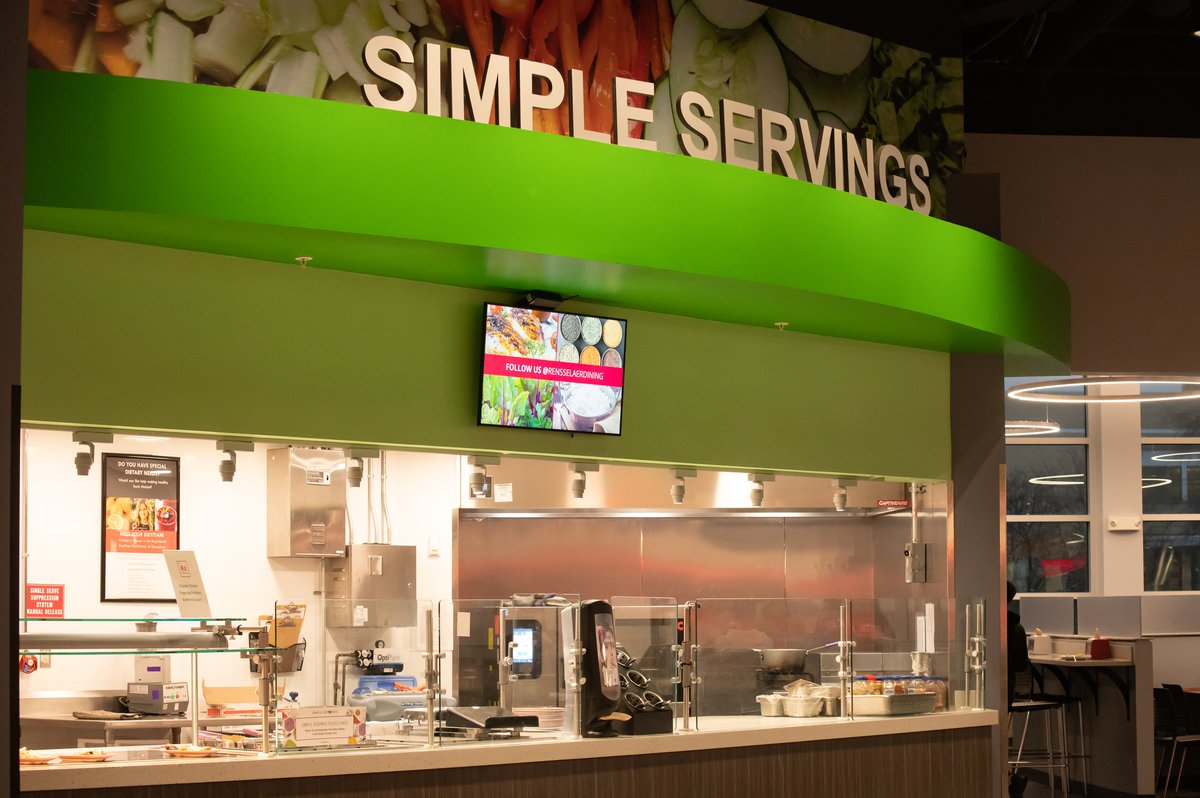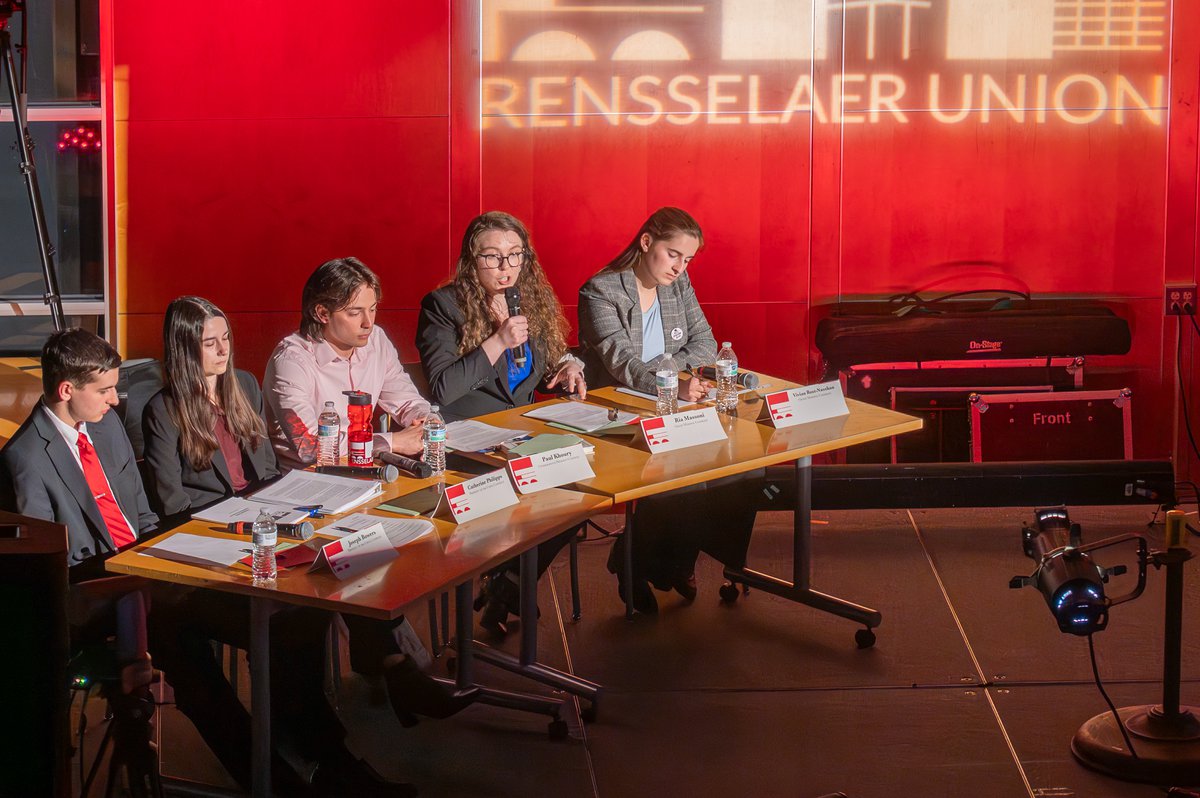RPI's failure to feed

The following is a collection of students’ experiences with dining halls at Rensselaer. Please note, the opinions in this article are not The Polytechnic’s, but mine and various students’ I spoke with.
Rensselaer fails to meet the needs of students with dietary restrictions. From interviews with students and personal experience, I can say without a doubt that RPI needs to do better at providing students with the food that they need. Whether for medical, religious, or personal reasons, many students on campus have needs that are not being properly addressed by the management of Dining Services and the Registered Dietitian and Nutritionist Kimberly Mayer. To get varying experiences, I spoke with multiple students with different restrictions.
The first experience comes from a first-year who has been a vegetarian for most of her life. Since consuming meat can easily make her sick, she has a hard time finding options, especially when the vegetarian section consists of the same undercooked rice and lentils every day. She plays a sport, so she needs nutritious food after practice. At Commons Dining Hall, many sections don’t have vegetarian options, so she ends up eating curly fries—not a sustaining meal for an athlete. She said that by the end of the day, most of the vegetables in the salad bar look rotten or unappetizing, making her stray away from that section. The pasta and pizza bar could be a good option for students like her because she can choose to not have meat. However, this section has caused the most issues for her, allegedly making her sick three times this year because of cross-contamination. She noted that the dining halls should use separate tongs and a different pan in the pasta bar. Her parents emailed First Year Experience, bringing up these issues, but to no avail. Now, she eats at the dining hall once a day, resorting to cooking for herself or skipping meals.
Xenia Khusid ’26, who is allergic to fish and tree nuts and keeps somewhat kosher—not eating pork and avoiding red meat and dairy together—shared her experience with me. She often eats at Simple Servings, but the chicken or rice will have fish or nuts in them. Khusid appreciates that there are descriptions, but notes that these could be more specific. Simple Servings is a section catered towards people with dietary restrictions, however it often has pork, which is a common restriction for many cultures. Regarding the salad and fruit bars, she once went to get granola for her yogurt and was shocked to see that they added almonds without putting a label. Tree nuts are a common allergen, so it is very surprising that there wasn’t even a sign emphasizing that a change was made. Since then, they got rid of the almonds, but Khusid said she didn’t notice the addition of nuts easily.
A sophomore who will go into anaphylaxis if she eats milk products told me about her story as well. She is currently on the Greek five-swipe meal plan but is worried about her Arch Summer when she is forced to move to the 12-swipe plan. Currently, she almost never eats at the dining hall—only twice this semester. She came to RPI as a long-term vegetarian, but ended up losing weight because she wasn’t eating enough on the meal plan. In addition, she emailed Mayer to get access to the Simple Zone room, which she was originally denied because of non-dairy milk stations already in the common area. Currently, some of the dispensers in the dining hall have been taken out or are consistently empty, limiting the options available. She struggles with sections like the salad bar because the cheese can easily get into the other vegetables and she is worried about cross-contamination. This student has stopped being a vegetarian due to her difficulties of keeping a vegetarian diet.
I also talked with Alexa Solomon ’25, who has celiac disease and cannot digest barley, wheat, or rye. She is currently on the 12-swipe plan which she uses only once or twice a day to get frozen meals from the Simple Zone. She also has struggled a lot with cross-contamination of food in the salad bar, so she mostly eats at Blitman Dining Hall because she knows the head chef. However, last September, she went to Blitman and got a noodle bowl that was noted as gluten-free. She asked repeatedly if it was gluten-free because she had a feeling that something was off, so she took a photo of the receipt saying it had no gluten. She ate the food and later ended up getting very ill, making her miss two days of classes. Moreover, Solomon has issues with late-night dining. Solomon will come to the dining hall later in the afternoon or evening, and find that there is almost nothing for her. There is the Simple Servings station, but often this food has been out for a while and the person at the station is nowhere to be found. In Commons, all the food is moved to the grill section and there aren't notes on what allergens are in the food, making it difficult to know what she can eat. In addition, school events tend to not cater for dietary restrictions, leaving her out of touch with the RPI community. Solomon finds it very difficult to find food, saying she has to choose to either “get sick or go hungry.”
Just three weeks ago, on Tuesday, March 28, Solomon went to Commons to get some non-dairy milk for her coffee. She went to the Simple Zone and picked up a Lactaid carton, only to find that the expiration date was February 25, 2023. She continued looking to see if other milk in the area had also expired, finding multiple that were, even oat milk cartons from October and November 2022. She was appalled and immediately told Mayer, who proceeded to look through the fridge. Solomon asked how often they clean out the fridge, to which she replied, “pretty often.” Solomon notes that Mayer was “frantically” cleaning the room after this. Solomon emailed the Sodexo District Manager, Firouz Khaksar, and the Director of Auxiliary Services, Michael Ramella, about these incidents. Khaksar and Ramella had differing amounts of knowledge on the issue, showing a lack of communication between departments. Solomon said that there should be steps on how Dining Services will fix this, but “clearly somebody is not communicating” because nothing is changing.
I also spoke with another student who needs to have more dairy than the average person due to important medical reasons. Earlier last semester, she had an incident where she found dead flies in her milk at Commons, so now she buys milk from Father’s Marketplace, which is expensive. She also had an incident in which she thinks she got food poisoning from the school, which could’ve easily become fatal for her. For students with medical issues, keeping a well-balanced diet is incredibly important, and having to worry about the quality of food shouldn’t be a concern.
On a similar note, I am on a low-salt and low-potassium diet for medical reasons. It is important that I keep a well-balanced diet, avoiding overly-salted or processed foods, as well as some fruits, vegetables, and grains that are high in potassium, such as bananas, potatoes, avocados, tomatoes, lentils, and beans. Eating at the dining hall is hard for me, making me resort to monthly trips to the grocery store to buy my food. This food I buy is an extra expense that I pay each year in addition to my $7,620 for the unlimited plan, which is required for all first-years. I get breakfast at Commons and occasionally go to Russell Sage Dining Hall for lunch, but they rarely have many options for me. I petitioned for a meal plan change, explaining that I am allowed a car on campus, making grocery shopping much easier. This was denied and I wasn't really sure what to do next. This year, I tried working with Dining Services, who told me that I could have personalized meals at Simple Servings. However, when I attempted to receive meals, many staff members didn’t recognize my restrictions. At some point, I stopped trying to go to the dining hall for lunch and dinner, and now I feed myself. Months after my first request, I resubmitted a petition to opt out of the meal plan, which was recently approved for next fall.
The Polytechnic reached out to the Office of Auxiliary Services for comment. They say that they are absolutely confident in their ability to provide for all students. Below is a comment given by Auxiliary Services.
Rensselaer does accommodate customers with special dietary needs. Those with food allergies, intolerances, and medical needs should contact our campus dietitian, Kimberly Mayer, at kimberly.mayer@sodexo.com. Occasionally, Dining Services cannot meet a student’s medical needs within normal service. In this case, the student will be directed to fill out an accommodation form and contact Disability Services for Students so our departments can work together to ensure nutritional needs are met.
The Office of Auxiliary Services did not comment on any of the experiences, saying individuals' dietary needs are confidential information.
In my personal experience, it is very unclear exactly what to do if you need these special accommodations. I have been told both to and not to go to the DSS. I have been told not to fill out the accommodation form and talk to the Office of Student Living and Learning in person, and have also been told that I must fill out the form. What worked for me was filling out the accommodation request, allowing me to have no meal plan as an on-campus sophomore. If you go here, you can complete the form. I recommend having plentiful documentation and proof of necessity. You can learn more about the help Sodexo provides here, which includes advice like downloading the Everyday app.
Mayer and Dining Services have been very kind but unhelpful, tending to overpromise and underdeliver in their actions. It is not a secret that RPI needs to do better when providing for students with dietary restrictions. However, as I dug deeper and talked to people, it became clearer that this is a severe issue. Food is a basic necessity that RPI is failing to properly address for its students, and I urge upper management to take the time to evaluate the current situation.

 Editorial Notebook
Editorial Notebook
 GM Week 2024
GM Week 2024
 Community Event
Community Event
 Editorial Notebook
Editorial Notebook